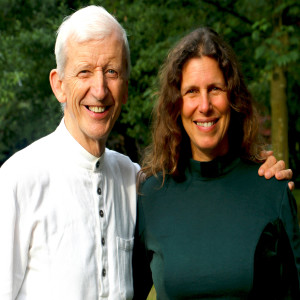Episodes

Saturday Jul 20, 2019
Saturday Jul 20, 2019
Lila interviewed Christopher Titmuss for several years, on different themes and topics relevant to awakening in our life.
Christopher Titmuss, a senior meditation and Dharma teacher in the west, a former Buddhist monk in Thailand and India, offers Dharma teachings addressing the wide variety of issues in daily life including mindfulness, meditation, communication and wise action.
Lila and Christopher are long term friends and were teaching together since 2004, including in this MTTC course (Mindfulness teacher training course).
EXTRACTS FROM THE INTERVIEW MTTC course, October 21, 2017 Germany
21.10.2017 MTTC Germany
The interview begins with conditions in centers in the west and east, (5 min)
Dharma has an outreach to reach to all, without exception.
Christopher reveals how he is working inwardly with negativity and blame being thrown at him the distinction between praise and appreciation and much more.
2 things: one is resilience: I have done enough impermanence practice to help with that…)
While listening the thought arises – this is what the person is telling me today. This might change.
The second thing is that I have to expect reaction. It comes with the role.
I make a distinction between praise and appreciation.
Praise is the wish to impress, saying kind words to others to build somebody up in order to get something I return. It might be recognition, wanting some approval, some extra agenda going with it.
Appreciative joy is free, because its Divine, from self interest.
What tells you the difference?
I smell it… with praise there tend to be a little exaggerate.
With blame – I search for the point of truth in it.
I don’t recall adopting the view – oh, it's just your projection on me. It's just your problem, not mine. I feel uncomfortable when teachers or anybody with authority makes that claim.
When there is something in it -
Do you ever get hurt or offended? Hurt sounds too strong… I'll feel plenty of unpleasant sensations…
The training over decades - The immediacy of the response – everything is around posture: physical posture and psychological posture, presence, eye to eye contact, Keeping the hands very still, checking for relaxation in the whole of the body. Though it feels unpleasant, but keeping present in front of it, in front of the other. The problem in the hearing is that its contracting, and my inner one liner – if I get upset or angry, I just handed my inner experience on a plate to somebody. I just refuse to do it!
The physical presence is remarkable for defusing. If I start to lose it feeling start coming up here and there, and then the voice… I might hurry from here to sit. Stop, have a minute of silence. In the silence, I'm really just feeling back down. Feeling back down, feeling deep, out of the field of thinking. Feeling the inside quite deep down of the body, that seems to be outside of the world of mind and thoughts and concepts.
Just for a minute, and then there is a readiness to speak or to go to the next thing.
Silence is the foundation of a healthy or appropriate communication.
In a conversation like that, generally speaking, I don’t start of the sentences with the 'I' language. To go into the 'I' language tends to sound defensive. It feels defensive. So rather than trying to explain, I find it easier and more effective to find one or two points and ask the group – O.K., in what way can we implement this? The group feels included and the person feels to a degree that they have been heard, simply because I haven't taken any notice of the blame factor running around in the person voice. And when we then come to some fresh understanding then turning to the person and asking – are you O.K. with this? And they always say yes. So it didn’t get into a dispute, and it would tend to if I was speaking about how I felt and what I was trying to do.
When I'm asked directly – then I have to speak directly. But If I don’t feel it’s a real necessity I don’t enter into the I language unless I think it is the best communication.
The combination of mindfulness and Samadhi really make a big difference. I'm incredibly dedicated to them. I really think it's an extraordinary way of the being that we can really give total attention to the other without forgetting the one who is attentive. The 50- 50 along with the feeling of liking and being interested in people, and lots and lots of practice, especially in the use of the ears – to really really listen – the words, the tone, the attitude, the intimations, the utterances, the subtleties, the grossness, the generalizations, the insights, all these is coming over and in real presence, as much as I can offer, and out of that things stand out. The Buzz words stand out actually quit loud for me, and the insights will stand out, or the confusion of the mind will stand out, and then – I go there. So keeping presence and interest and bringing all the other factors that we have – from the ethics to the spiritual to the happiness to the dukkha to the understanding to the dependent arising of the avijjya paccaya samskara (ignorance conditioned reaction formations): it's all there, the support we all have, and can turn to it, and use it for the exploration, for the inquiry.
Of course it needs interest and it needs energy, but they tend to come, with a few other factors.
The importance of Samadhi (starts min.27)
It's one of the questions because It gains a little extra urgency, simply because all the way our concentration on things gets fragmented through all the entertainments. Its having its impact. The Samadhi is a big factor in having the capacity to act.
The meditation retreats with returning of the attention on the object, successive moments of attention mindfulness upon the object is the development of Samadhi.
In daily life - areas of interest that worth concentrating on. like painting a picture or listening to music, but really making it a meditation. It tends to be a weak link. Because of the working environment, that is so demanding on concentration, it can be infecting the concentration with stress and worry and agitation. But if the mode of the being is relaxed, settled, collected, composed upon the particular, with contentment and happiness there will be much less need to want to get away from it. The primary reason for people to take time off work is stress related.
Mindfulness needs concentration; it needs a meditation on the object.
Its Sila, Samadhi Panna, not Sila, Sati Panna… The monasteries, of course they emphasized mindfulness, but mostly Samadhi.
People would say, oh, you practice to get somewhere, trying to get liberated, trying to get free. Because if you practice you still having to do something. Of course I don’t buy that position. For myself, it’s a great freedom to practice. It’s a confirmation of freedom. One is free to practice, to explore, to develop heart and mind, free to appreciate there is no limits to their potential. Those who think practice is only means and goal oriented haven't understood it's an expression of a liberation, not an abstraction to it.
The same happened with Roshi, Leonard Cohens teacher, and with Punja. (meditation without trying to get somewhere…).
One got to be free in all directions, therefor free to practice. people who rubbish it, are a little bit in danger of getting stuck with some old views, habits and patterns, which they might need to work on but it will get in the way if they think practice abstracts freedom. Thinking the same old way is much more abstraction.
There is tradition where the teaching communication is much more with the regular sustained way with the formless. Others like us use the form and love the formless, and we move between the two.
That sense of being with the rhythms of life and some outcomes and some consequences but is seems kind of small change to the bigger sense. You and I come here, we have the privilege of offering this program, there is the wish of course that it will be insightful and beneficial, the consequences of it help to develop agents of change, but there is some sense of knowing that we are not in control of all of that, we are just offering something, making something available, and maybe out it it something will flow and we know that our freedom is these expressions and we expressing it and let the wind will take it as it will.


No comments yet. Be the first to say something!